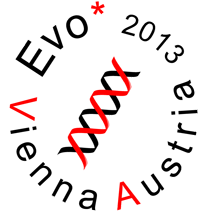 Guest blog post by William S. Bush, co-organiser of EvoBIO 2013, which is the leading European event on bio-inspired and evolutionary computation. This year EvoBIO will be held on 3rd – 5th April in Vienna, Austria. It is also collaborating with BioMed Central’s BioData Mining journal to offer free publication to the winner of this year’s best paper award.
Guest blog post by William S. Bush, co-organiser of EvoBIO 2013, which is the leading European event on bio-inspired and evolutionary computation. This year EvoBIO will be held on 3rd – 5th April in Vienna, Austria. It is also collaborating with BioMed Central’s BioData Mining journal to offer free publication to the winner of this year’s best paper award.
For over 15 years, members of the computer science, machine learning, and data mining communities have gathered in a beautiful European location each spring to share ideas about biologically-inspired computation. Stemming from the work of Holland who pioneered the field of genetic algorithms, the evolutionary optimization work of Rechenberg and Schwefel, and the evolutionary programming technique of Fogel, multiple approaches have been developed that exploit the dynamics of natural systems to solve computational problems. These algorithms have been applied in a wide variety of fields, and to celebrate and cross-pollinate ideas from these various disciplines the EvoStar event co-locates five conferences at the same venue, covering genetic programming (EuroGP), combinatorial optimization (EvoCOP), music, art, and design (EvoMUSART), multidisciplinary applications (EvoApplications), and computational biology (EvoBIO).
 Bio-inspired approaches are of special interest to biologists, first because of their ability to model complex non-linear patterns often inherent to biological data, and secondly because the techniques are often based on familiar biological concepts. Examples of these include ant colony and swarm optimization, genetic programming and grammatical evolution, and artificial immune systems. Some of these techniques have been seamlessly integrated in existing software packages such as the molecular docking prediction software. Other applications include fitting parameters of differential equations (often used in kinetic studies), motif discovery tasks in genomic sequence, phylogenetic tree generation, and protein structural prediction.
Bio-inspired approaches are of special interest to biologists, first because of their ability to model complex non-linear patterns often inherent to biological data, and secondly because the techniques are often based on familiar biological concepts. Examples of these include ant colony and swarm optimization, genetic programming and grammatical evolution, and artificial immune systems. Some of these techniques have been seamlessly integrated in existing software packages such as the molecular docking prediction software. Other applications include fitting parameters of differential equations (often used in kinetic studies), motif discovery tasks in genomic sequence, phylogenetic tree generation, and protein structural prediction.
Bio-inspired methods have also been extensively applied in data analysis and modeling, specifically of genetic data. Traditional methods such as expectation maximization are “greedy” approaches that are susceptible to local optima – that is, they may not find the overall best solution to a particular problem. As such, traditional approaches may only detect the most elementary effects present in the data. Detecting complex effects with non-linear interactions among input variables requires new strategies and is an area of incredible interest for a variety of biological classification and modeling tasks.
 EvoBIO 2013 will be held in Vienna, Austria where multiple research groups from the US and Europe will present their exciting work. Examples include: Ahmed, Zhang, and Peng who use a genetic programming approach for feature selection and classification of high-dimensional mass spectrometry data; Salama and Freitas who classify age-related proteins using ant colony optimization; González-Álvarez et al. who apply bee colony optimization to DNA motif discovery; and Santander-Jiménez who use a variant of the firefly swarm optimization method to phylogeny inference. A full list of abstracts can be found here.
EvoBIO 2013 will be held in Vienna, Austria where multiple research groups from the US and Europe will present their exciting work. Examples include: Ahmed, Zhang, and Peng who use a genetic programming approach for feature selection and classification of high-dimensional mass spectrometry data; Salama and Freitas who classify age-related proteins using ant colony optimization; González-Álvarez et al. who apply bee colony optimization to DNA motif discovery; and Santander-Jiménez who use a variant of the firefly swarm optimization method to phylogeny inference. A full list of abstracts can be found here.
EvoBIO is very pleased to be sponsored by Biodata Mining, a natural partner for this conference. The winner of the EvoBIO best paper award will receive free publication in Biodata Mining, and runners-up will receive 25% discount off the article processing charge (APC). So if you work on a complex biological problem and would like new creative ways to mine your data, consider attending EvoBIO! We hope to see you there.
Find EvoBIO on Facebook, and follow BioData Mining on Twitter @moorejh.
Comments